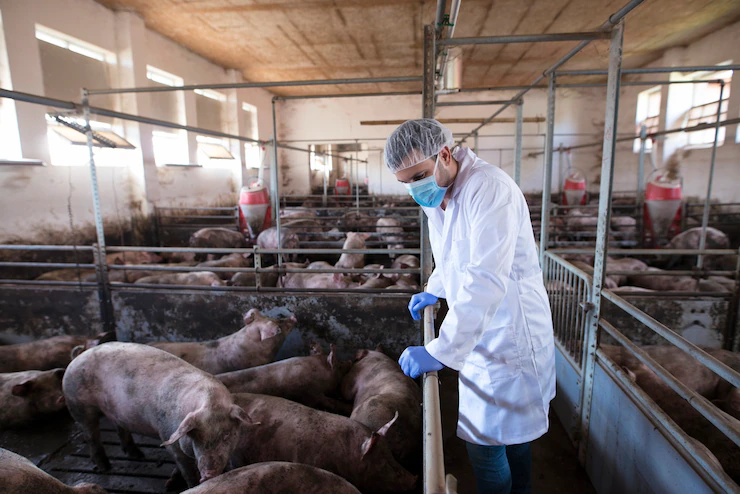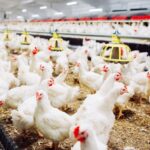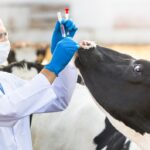Pigs are an essential part of South Africa’s agricultural sector, contributing significantly to both the local market and export industry. However, managing a healthy pig population requires vigilance and proactive measures to prevent and control common diseases. This article provides South African farmers with valuable insights into the most prevalent pig diseases, their symptoms, prevention strategies, and treatment options.
1. African Swine Fever (ASF)
Symptoms:
- High fever
- Loss of appetite
- Reddening of the skin
- Respiratory distress
- Bloody diarrhea
Prevention:
ASF is highly contagious and often fatal. To prevent outbreaks, maintain strict biosecurity measures, including controlling farm access, using disinfectants, and avoiding contact with wild pigs. There is no vaccine for ASF, so prevention is crucial.
Treatment:
Currently, there is no cure or treatment for ASF. Infected animals should be culled to prevent the spread of the virus.
2. Porcine Reproductive and Respiratory Syndrome (PRRS)
Symptoms:
- Respiratory issues in pigs of all ages
- Reproductive failure in sows (abortions, stillbirths)
- Poor growth rates
Prevention:
Vaccination is available for PRRS and should be part of your farm’s health management plan. Quarantine new animals and practice good hygiene to minimize the risk of infection.
Treatment:
No specific treatment exists for PRRS. Supportive care, including good nutrition and minimizing stress, can help manage the symptoms.
3. Swine Influenza (Swine Flu)
Symptoms:
- Fever
- Coughing
- Nasal discharge
- Lethargy
Prevention:
Vaccinate pigs against swine flu and maintain good ventilation and hygiene in pig housing. Isolate any sick animals to prevent the spread of the virus.
Treatment:
Treatment focuses on supportive care. Antibiotics may be prescribed to prevent secondary bacterial infections.
4. Foot-and-Mouth Disease (FMD)
Symptoms:
- Blisters on the mouth, snout, and hooves
- Lameness
- Fever
- Drooling
Prevention:
Vaccination and strict biosecurity measures are essential. Avoid contact with infected animals and ensure that feed and water are uncontaminated.
Treatment:
There is no specific treatment for FMD. Infected animals are often culled to prevent the spread of the disease.
5. Erysipelas
Symptoms:
- Skin lesions
- Fever
- Joint pain
- Sudden death in severe cases
Prevention:
Vaccination is available and effective against Erysipelas. Maintain good hygiene and rodent control on the farm.
Treatment:
Antibiotics are effective in treating Erysipelas if administered early. Consult with a veterinarian for the appropriate course of action.
6. Gastrointestinal Parasites
Symptoms:
- Diarrhea
- Weight loss
- Poor growth
Prevention:
Regular deworming and maintaining clean housing conditions are critical. Rotate pastures if pigs are kept on pasture.
Treatment:
Administer appropriate anthelmintic treatments as prescribed by a veterinarian.
7. Mycoplasma Pneumonia
Symptoms:
- Chronic cough
- Reduced growth rates
- Poor feed conversion
Prevention:
Vaccination is available and should be included in your farm’s health plan. Maintain good ventilation and reduce overcrowding.
Treatment:
Antibiotics can be effective, but treatment should be based on veterinary advice.
8. Leptospirosis
Symptoms:
- Fever
- Jaundice
- Reproductive issues (abortions)
Prevention:
Vaccinate against Leptospirosis and maintain good rodent control. Provide clean water and feed.
Treatment:
Antibiotics are effective if administered early. Work with a veterinarian to establish a treatment plan.
9. Swine Dysentery
Symptoms:
- Severe diarrhea
- Weight loss
- Lethargy
Prevention:
Maintain excellent sanitation, and implement an all-in, all-out system in pig housing. Control rodent and fly populations.
Treatment:
Antibiotics and supportive care can be effective. Consult with a veterinarian for the best treatment options.
10. Aujeszky’s Disease (Pseudorabies)
Symptoms:
- Fever
- Respiratory distress
- Neurological symptoms (seizures)
Prevention:
Vaccination is the primary preventive measure. Practice strict biosecurity and avoid introducing infected animals to the herd.
Treatment:
There is no cure for Aujeszky’s Disease. Management focuses on prevention through vaccination and culling of infected animals.
Managing the health of your pig herd is crucial for maintaining productivity and profitability. By being aware of common diseases and implementing preventive measures, South African farmers can reduce the risk of outbreaks and ensure the well-being of their animals. Regular veterinary check-ups, vaccination programs, and strict biosecurity protocols are essential components of a comprehensive health management plan. Remember, early detection and intervention can save your herd and your livelihood.
Join 'Farmers Mag' WhatsApp Channel
Get the latest Farming news and tips delivered straight to your WhatsApp
CLICK HERE TO JOIN






